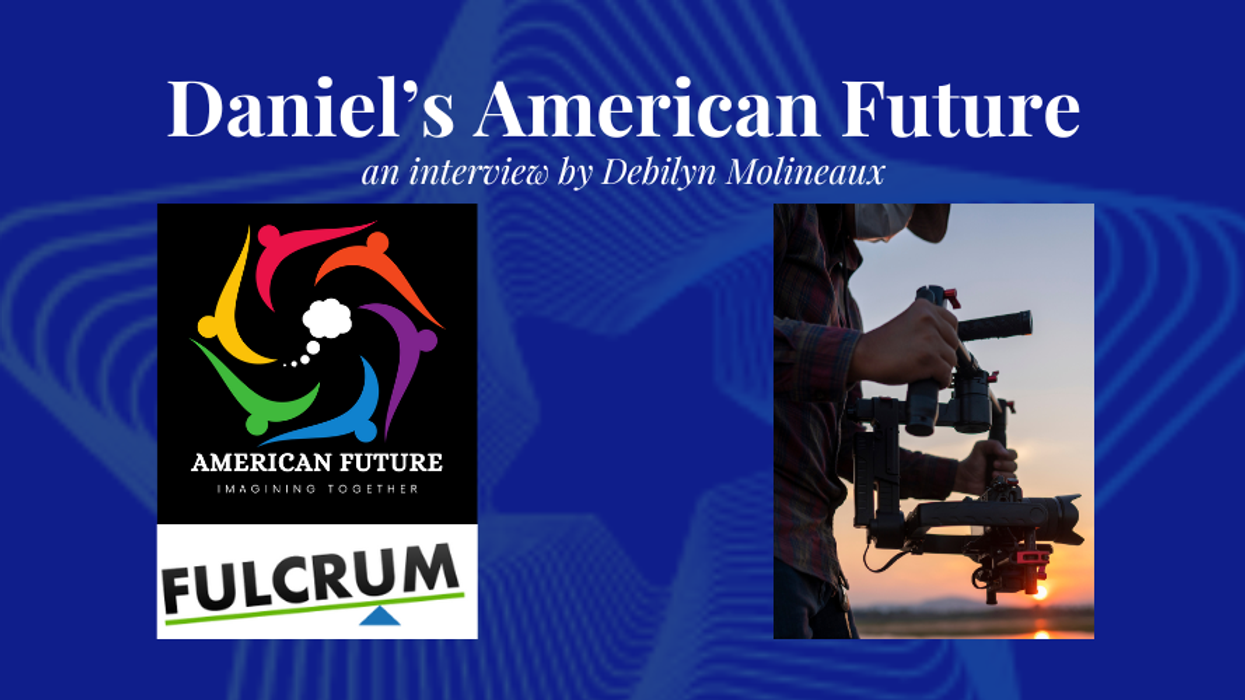This is part of a series of interviews by Debilyn Molineaux, project director for AmericanFuture.US. This project's mission is to help everyday Americans to imagine a better future for themselves, and together we’ll write the next chapter of the United States of America.
Daniel Osuma was referred to me by a longtime work colleague. In the 18 months since we first met, I’ve observed an openness in him that is refreshing, as he engages with people very different from himself. As a storyteller, he leads with curiosity, asking people about their experience in life and believing them when they share. This rare talent continues to inspire me. This interview took place on Nov. 15, 2023, and has been lightly edited for clarity.
Debilyn Molineaux: We are going to time travel today – within your current life. How far would you like to imagine together? We recommend somewhere between two and 20 years. What sounds right for you?
Daniel Osuna: Ten years, to 2033.
DM: Let’s take a few deep breaths as the time machine takes us to this imagined future. I ask that you observe yourself there and respond to these questions. Where are you in 2033?
DO: I live by the beach, Manhattan Beach. The kids are getting ready for school and I’m helping them. My future wife is devout Catholic, college educated, and has a professional job like teacher or nurse. She is kind, gentle, gracious, dependable. Likely Latina, because she’ll fit in better with my family. A dancer-type, which I seem to attract. I think she is also artistic. She’ll probably know music pretty well, which is a deficiency of mine. So she would compliment me that way. We have continued growth and increasing cultural competency.
DM: What will you be most proud of?
DO: Being a good father, being a good and faithful husband. Being the rock of my family, friends and church. Being someone dependable that others rely on. I’m proud of being a good man, and others know I’m a good man, too. People trust me. I’m a filmmaker and I've made a couple of movies, and I’ll be proud of cultivating the gifts God gave me, sharing some of the universal immigrant experience, especially Mexican-American, perhaps some of the women’s experiences. I’ve grown and developed, using my strength of character and discipline to create art that is unifying.
DM: How will you spend your day?
DO: I’ll get up around 4 or 5 a.m. to do my morning routine, run, read Scripture. I’ll spend three to four hours a day writing, another three to four hours a day doing administrative stuff. Mostly writing and project work during the day. When the kids get home, we’re cooking and playing with them. We ensure their schoolwork is done. Maybe some after-school tutoring thing. Check up on them to ensure they are doing well, guiding their development. Doing fun things. Spending time with the future wife. Late evening return to writing. I’ll spend time with family friends and church friends, too, where we spend time together and support one another.
DM: How will you feel, most of the time?
DO: Overwhelmed, trudging along but happy. Entirely fulfilled. I’m growing, doing life together with my family and friends. Being sad is part of life, but it’s manageable. I feel joy. I feel strong.
DM: What will be your three to five priority values or qualities?
DO: Faithfulness to my wife and relationships. Trustworthiness. Graciousness with others and myself. Life is hard and we all make mistakes. I’ve often been too hard on myself. We fall short in a variety of ways and need grace. I value trusting God and having patience that he’s got my back. Patience, too. Last, charity —it’s important to make time to help others. Someone always needs help. I like to pay it forward.
DM: What does the community that supports your future need to include?
DO: My future community needs men of honor who ascribe to live out Christian Catholic values. It needs artistic people who seek God, where we cultivate our craft. Plenty of women friends that demonstrate trust. Entrepreneurial thinking. Writers. A Catholic Church in Manhattan Beach, maybe. Good Catholic schools for children. Safety on the streets, surfing, good gyms to stay healthy. A creative community, access to healthy foods. Other support to make quality of life affordable.
DM: Is there anything you can do today or in the near future to influence or co-create the community that will support you in 2033?
DO: I am involved in the men's group, on Sundays, with young adults during the week. Some of this I’m living already, we have an artistic writing group, so continuing to be part of these groups and being faithful to that community. I could explore Manhattan Beach for what I need – creative groups, surfers, faith communities, and more. I am concerned about being corrupted by luxury and atmosphere in Manhattan Beach. Maybe Torrance is a better option, due to cost of living.
DM: How will you meet your future wife? Can you maybe put your future strong self in places where you could meet her?
DO: OMG, Debilyn, I love you. YES! Wow, yes. I really could do that.
Here's my invitation to you, and all Americans. Spend five minutes every day thinking about your future self, feeling those feelings, and include a sense of awe and wonder. This is based on neuroscience research that shows we subconsciously create what we focus on. So the choice is ours: We can actually co-create the future we prefer instead of choosing from the dystopian options presented to us. You can find a self-interview and others’ stories at AmericanFuture.us.




















Trump & Hegseth gave Mark Kelly a huge 2028 gift